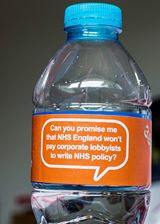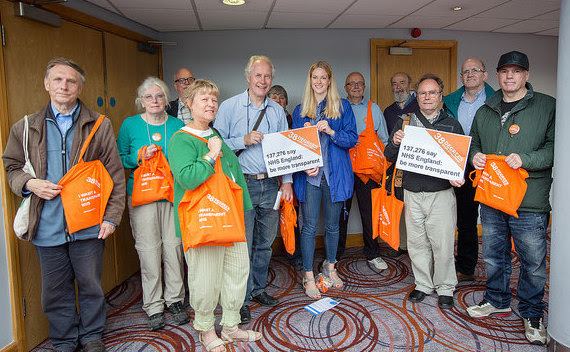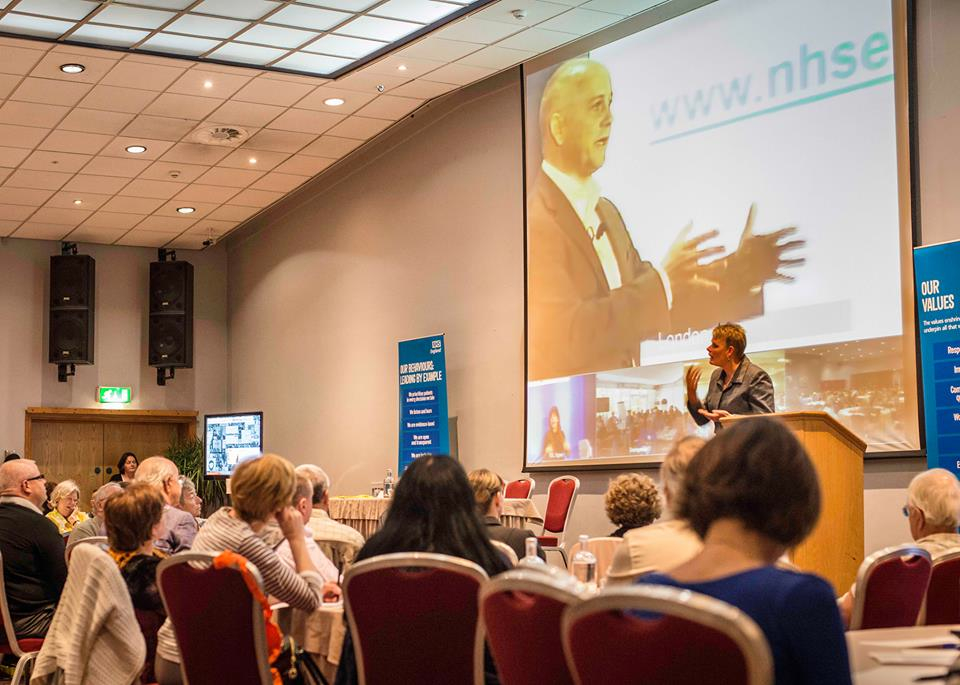Calderdale 38 Degrees supporters who attended NHS England’s “Citizen Participation” meeting in York on Tuesday 17th June found the event full of contradictions.
Roger O’Doherty and Morrilly Gudenuff (not the delegate’s real name!) were among 38 Degrees supporters calling on NHS England to come clean about undisclosed meetings with private health care lobbyists and the role of Big Pharma in drafting its plans.
They handed NHS England a petition, signed by over 140,000 people, demanding that NHS England declares all its meetings with lobbyists, as well as any conflicts of interest.
Transparency and secret deals
NHS England’s Patients and Information Directorate (PID) was in York and four other cities – all digitally linked up- to ‘listen to patients and professionals’ as part of a professed commitment to transparency.
Roger O’Doherty watched a presentation by Tim Kelsey, National Director for Patients and Information in the NHS, via the video link. Roger commented,
“On the screen, Tim Kelsey is illustrating the benefits of NHS patients having personal budgets, with a case study. The case he cites is of a gentleman attending a day centre. He wasn’t enjoying the experience as the television in the lounge only had 3 channels and there were frequent arguments about which to watch. Personalised budget to the rescue…the man was enabled to buy a SkyBox and now sits at home watching what he likes.
At this rate they will no doubt soon be able to close the day centre.
I was just flabbergasted that someone at that level could tell that story.
Tim Kelsey, co-founder of Dr Foster, got in a name check for the health data company that he co-founded. He clearly has an interest in NHS data.”
Dr Foster became a joint venture with the Department of Health in a £12m secret deal criticised by the National Audit Office in a 2006 report.
Of the £12m that the Department of Health shelled out, £7.6m was paid directly to Dr Foster LLP and the rest used for working capital for the joint venture, Dr Foster Intelligence. The Department of Health set up the joint venture without any competitive tendering. This meant that the deal could have been open to legal challenge.
Plain Speaker has tweeted Tim Kelsey inviting him to comment, but he hasn’t replied. He is of course welcome to do so at any time.
Skewed, commercialised data, breaches of NHS data security and the care.data scheme
Dr Foster’s NHS data have been subject to considerable criticism, particularly its calculation of hospital death rates. An Open Democracy article has raised the question:
“If commercialised data jeopardises hospitals futures, do skewed stats become big business?”
If skewed, commercialised data are used to name and shame hospitals for under-performing, could this lead to public dissatisfaction with NHS hospitals and an exodus of people with money for private insurance and good enough health to qualify for private insurance, to the private healthcare sector?
While Tim Kelsey was talking about data sharing, media reports were coming online of major breaches of NHS data security in the recent past: in “data sharing” deals with three re-insurance companies, the NHS had allowed them access to personal confidential patient data under deals that don’t expire until 2015 or 2016. The NHS had sold 588 data packages containing confidential patient records to a range of private sector organisations between 2005 and April 2013.
The Register quoted privacy campaigner Phil Booth of MedConfidential as saying,
“The Health and Social Care Information Centre clearly know they are in a mess – data sent into black holes, limited information on a tenth of releases, no information on the uses to which data was put, no proper audit or audited deletions and dozens of commercial re-use contracts still in operation. This all has to be fixed, and be seen to be fixed, before NHS England can be allowed to proceed with any plan to hoover up yet more data.”
He warned that the care.data scheme “could be a re-run of IC/Dr Foster 2006.”
The care.data scheme is a controversial NHS proposal to extract identifiable confidential patient data from GP surgeries and merge them with confidential patient data from hospital and clinic appointments.
Earlier this year, the care.data proposals caused a public outcry over data protection breaches, lack of patient consent and the unsafe handling and misuse of identifiable personal confidential medical data. This was triggered by the discovery that identifiable confidential patient data had been insecurely uploaded to the cloud by PA Consulting – the company that Calderdale and Greater Huddersfield CCGs paid nearly £1m for support for the Strategic Review of health and social care.
The Citizens’ Participation events fell in the middle of the care.data pause – a six month halt to review the care/data proposals.
Morilly Gudenuff said:
“Via the video link we had Tim Kelsey introducing new personal care budgets. But the new progressive NHS wants to improve ‘care’ even more, by sucking up all your data, so that they know who you are and where you live, what treatments work and which don’t, how to develop new treatments and profit Big Pharma – like Roche, which sold the NHS nearly £500m worth of Tamiflu before the drug turned out to be inefficacious.”
After Roche had pocketed the NHS’s £437m for a stockpile of the anti-viral bird flu drug, independent research found that Tamiflu worked no better than paracetamol.
Carl Heneghan, Professor of Evidence-Based Medicine at the University of Oxford and one of the authors of the report that claimed Tamiflu was a waste of money, told the BBC,
“The system that exists for producing evidence on drugs is so flawed and open to misuse that the public has been misled.”
Morilly Gudenuff reported this has not induced any caution in NHS England’s Patients and Information Directorate:
“They know care.data is the best thing since sliced bread (how nutritious is that) and that the system will not be as efficient if there is a gap caused by some people opting out! They were saying, ‘We want to know what will convince you that care.data is safe! Tell us what you think we can do to reassure you that we will keep your data safe, because it IS YOUR DATA, it doesn’t belong to NHS England! And by the way we are going to make it more accessible so you can see it over the internet!’
Recently the Government has legislated that data can not be sold solely for commercial purposes. But what if a company has a dual purpose?“We were invited to write questions on a piece of paper because they needed one for the plenary of the morning. It was promised that the questions would be answered and posted on a website. Or somewhere.
“I had brought questions with me to the event, hoping for a chance to get some answers.”
“Impossible” for data to be misused
Roger O’Doherty commented,
“We were of course assured this morning that it would be ‘impossible’ for data to be misused. That would have been by Tim Kelsey of course. Even if someone in the room had the facts at their disposal the format wouldn’t have permitted them to be stated.”
Morilly made the same point,
“Video conferencing was a good illustration on how to keep those being engaged with, at a distance from the organisers. Really there was no opportunity to tell truth to power. The scribes who wrote down points raised in a discussion round the tables, about care.data and what steps need to be taken before you would be happy to let your data be uploaded, were lowly employees of NHS England or a website offering some service or another.
One of the few comments allowed from ‘the York floor’ was someone who suggested that mental health patients would be very reluctant to fill in anything like the Friends and Family test, because the very act of asking them may be construed as inviting patients to put themselves in the position of being victimised later, especially if their response contained negative comments. It was conceded that the Friends &Family test was to be used in conjunction with other forms of patient feedback.
I was not the flavour of the month at the workshop about Patient Feedback. I suggested that the Friends and Family test was a political tool designed to enable Hospital Trusts and GP surgeries to be put into league tables. (Wrong, it is designed to help nurses and ward managers improve the service. Doh!)
 The question on the 38 Degrees water bottle is still waiting for an answer from NHS England:
The question on the 38 Degrees water bottle is still waiting for an answer from NHS England:
“Can you promise me that NHS England won’t pay corporate lobbyists to write NHS policy?”


